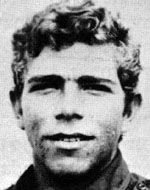Katz, Zvi (‘Zvika’)
Son of Yitzhak and Leah. He was born on the 12th of Tammuz 5716 (June 12, 1956) in Tel Aviv to parents who met in Israel as new immigrants, who bear the burden of their entire family and the experiences of the Holocaust. Zvika began his studies at the Yehuda Maccabee Elementary School in Tel Aviv and after the family moved to Bat Yam he completed his studies at the Nachshonim School in this city. And was naturally gifted with “gold hands” and it was natural that he continued his studies at the ORT vocational school in Holon, with the aim of mechanical frameworks, while studying at the Israel Institute of Technology I was a teacher of written education, and I went on to study in four matriculation exams, and during those years Zvika returned to his parents full of love, and the period of overcoming them, which usually leads to crises between boys and parents, passed through this family in harmony. , Especially when he saw a cloud of worry descend upon them during singing and playing hours, which would transfer the family to a world that was all good and with many small acts of presence and help, to convince the parents that a son had grown up to be trusted. During these years, Zvika developed his sport-related hobbies, mainly swimming in the sea and being an amateur lifeguard. He was an excellent dancer, singer, guitarist, but his ability to lead was mainly due to the rare quality of this age of lack of aggressiveness And not ashamed to uphold the value of the compromise, not only handsome but Yaffa, but the verse “Love your neighbor as yourself …” In February 1975 he was called to enlist in the IDF. As a graduate of a vocational school, he was transformed into an engineering corps and underwent exhaustive training – a training course, a plasim course, a course for commanders and a course for noncommissioned officers, and Zvika – Zvika remained in the army. Zvika took him on his back 15 kilometers when he was offered to be the unit’s noncommissioner – Zvika rejected the proposal on the grounds that he could not humiliate recruits. Finally he appeared before a medical committee, which wanted to consider a medical issue in his kidneys and demanded that he be assigned to a combat unit. He was transferred to the air force and assigned to a dung disposal unit. At the beginning of his service in this unit, he was sent to the mission on which he fell, on Sinai, on 21 January 1976, when he and his friend were ordered to evacuate IDF training grounds from the survivors who had survived the Yom Kippur War. “I knew Zvika only three hours later,” he later wrote to his parents. Another of the reservists who was with me suggested to Zvika and his friend to help them, as he had basic knowledge of the subject in which they were engaged, but they replied: “I was one of those who went out to accompany him and his friend in order to contact our unit and secure the area. “We were stunned by the disaster, but we knew that they not only fell in the line of duty but gave their lives for us, for all the units who train and prepare themselves to be prepared to stand up against us. An enemy … “Zvika’s father relates:” The day before Tsim Tzedek arrived in Sinai for his mission, fate summoned both of us to Leo I asked him if he would stay at home and replied, ‘No. Tomorrow I have to fly to Sinai.’ “I was silent, but he read my thoughts:” Come on, Dad, you’ll be a man. ! ‘ The next day I phoned the base to ask if Zvika had already returned, told me that he had not returned yet”He was brought to eternal rest in the military cemetery in Holon, where he was raised to the rank of sergeant, who was followed by his parents and sister, and another was added by his commanding officer:” Zvi was made of the same material as the best of them … The day-to-day activities of our unit are dangerous and require maximum effort and the majority and immediately discover the person for good or evil. Zvi was discovered as one of the most wonderful … He perished during an operation which by its nature is sacrifice for others … Zvi knew and understood the significance of his work, but volunteered for the operation of that day.
